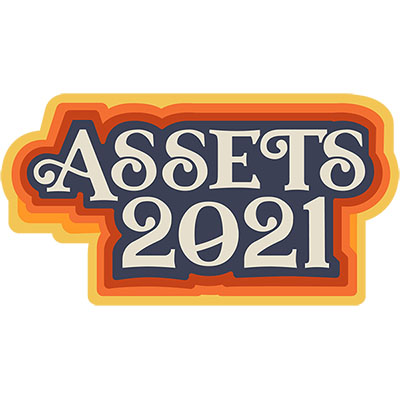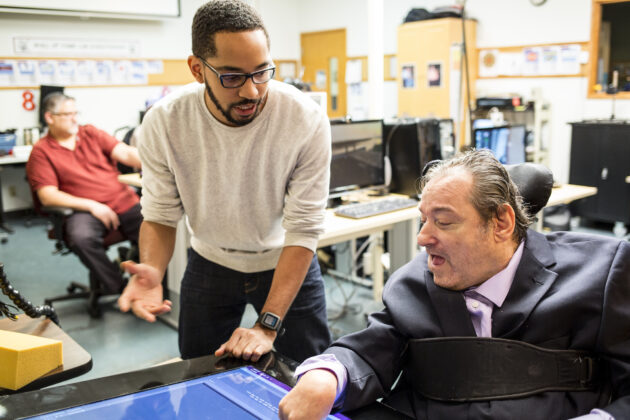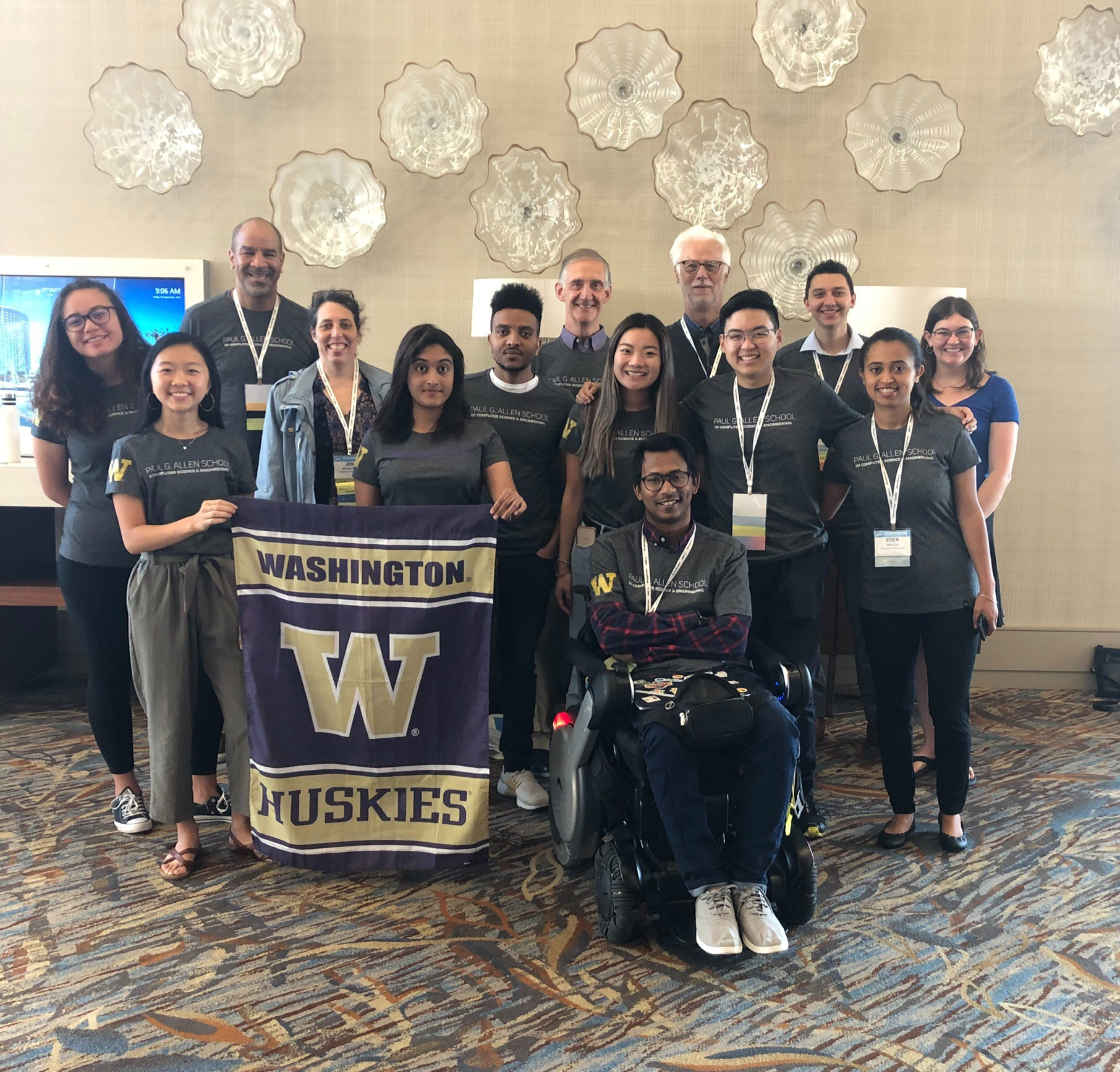Dr. Mankoff, a professor in the Information School and the Paul G. Allen School of Computer Science & Engineering, will speak at the UW’s GAAD mid-day program on Thursday, May 15. What initially drew you to the intersection of computing, accessibility, and disability studies? I was a computer scientist first—and then I became disabled. That personal shift made me start thinking about how technology could better meet my needs. My first faculty position was at UC Berkeley, which was at…
Category: Jennifer Mankoff news articles
CREATE researchers find ChatGPT biased against resumes that imply disability, models improvement
June 24, 2024 This is the takeaway from CREATE Ph.D. student Kate Glazko, who got curious when she noticed recruiters posting online that they’d used OpenAI’s ChatGPT and other artificial intelligence tools to summarize resumes and rank candidates. Advised by co-author and CREATE Director Jennifer Mankoff in the Allen School, Glazko studies how GAI can replicate and amplify real-world biases — such as those against disabled people. So how might such a system, she wondered, rank resumes that implied someone had a…
Alice Wong and Patty Berne: Two UW lectures moderated by CREATE researchers
January 29, 2024 Winter 2024 quarter kicked off with two outstanding conversations with women of color who are leaders in disability justice. Alice Wong: Raising the visibility of disabled people First, Alice Wong discussed topics important to her work in raising the visibility of disabled people. Wong’s book Year of the Tiger: An Activist’s Life was the topic of the Autumn 2023 CREATE Accessibility Seminar. CREATE Director Jennifer Mankoff started the conversation asking Wong about her experience as a disabled person…
UW News: Can AI help boost accessibility? CREATE researchers tested it for themselves
November 2, 2023 | UW News Generative artificial intelligence tools like ChatGPT, an AI-powered language tool, and Midjourney, an AI-powered image generator, can potentially assist people with various disabilities. They could summarize content, compose messages, or describe images. Yet they also regularly spout inaccuracies and fail at basic reasoning, perpetuating ableist biases. This year, seven CREATE researchers conducted a three-month autoethnographic study — drawing on their own experiences as people with and without disabilities — to test AI tools’ utility for accessibility. Though researchers…
Increasing Data Equity Through Accessibility
Data equity can level the playing field for people with disabilities both in opening new employment opportunities and through access to information, while data inequity may amplify disability by disenfranchising people with disabilities. In response to the U.S. Science and Technology Policy Office’s request for information (RFI) better supporting intra- and extra-governmental collaboration around the production and use of equitable data, CREATE Co-director, Jennifer Mankoff co-authored a position statement with Frank Elavsky, Carnegie Mellon University and Arvind Satyanarayan, MIT Visualization…
Jen Mankoff receives SIGCHI Social Impact Award
Congratulations to CREATE Co-Director Jennifer Mankoff! She has been awarded a 2022 Social Impact Award by SIGCHI, the special interest group of the Association for Computing Machinery (ACM) for professionals, academics and students interested in human-technology and human-computer interaction (HCI). Mankoff was cited for research focused on accessibility to give people the voice, tools and agency to advocate for themselves. “She strives to make change at both structural and individual levels. For example, her recent work on fabrication of accessible…
CREATE student Venkatesh Potluri is an Apple Scholar
Venkatesh Potluri has been selected as a 2022 Apple Scholar — a fellowship that supports cutting-edge machine learning researchers at the graduate and post-graduate level. A Ph.D. student in the Allen School, Potluri is advised by CREATE Co-Director Jennifer Mankoff in the Make4All Group. As an Apple Scholar, Potluri is recognized as an emerging leader in computer science and engineering and will receive funding to pursue his Ph.D., internship opportunities, and mentorship with an Apple researcher. Potluri’s research makes overlooked software…
Faculty and Alumni win awards at ASSETS 2021

CREATE faculty and alumni scooped up several awards at the ASSETS 2021 conference. Paper Impact Award: Mankoff, Best Paper award: Katharina Reinecke, Best Artifact: scia11y team.
$1M NIDILRR award for leadership training program
A team of CREATE faculty has received a five-year, $1M grant from the National Institute on Disability, Independent Living, and Rehabilitation Research (NIDILRR) for the project, “ARRT: Postdoctoral Training in Physical Computing and Fabrication to Support Innovations for Community Living and Participation.” Congratulations on the funding to the team members: Co-PI Jennifer Mankoff, Ph.D and Professor Paul G. Allen School of Computer Science and Engineering Co-PI Anat Caspi, Ph.D. and Principal, Paul G. Allen School of Computer Science & Engineering…
Mankoff wins AccessComputing Capacity Building award
December 16, 2020 Through her leadership, the SIGCHI Executive Committee now has adjunct chairs for accessibility, which institutionalizes accessibility as an important facet of SIGCHI activities. Jen holds monthly online meetings of the AccessSIGCHI leadership team to help set and execute its agenda. Every year AccessComputing honors someone with the AccessComputing Capacity Building Award for their work and accomplishments that have changed the way the world views people with disabilities and their potential to succeed in challenging computing careers and activities. Excerpted from an…
CREATE faculty and students awarded at ASSETS 2020
Congratulations to UW CREATE faculty on multiple awards at ASSETS 2020, the International ACM SIGACCESS Conference on Computers and Accessibility! “The University of Washington has been a leader in accessible technology research, design, engineering, and evaluation for years. This latest round of awards from ACM ASSETS is further testament to the great work being done at the UW. Now, with the recent launch of CREATE, our award-winning faculty and students are brought together like never before, and we are already…
UW CREATE leadership at ASSETS 2020
UW CREATE has a large and quality presence at ASSETS 2020, the premier annual conference for accessible computing research. Drawing from three departments, University of Washington authors contributed to six papers and two posters to be presented at this year’s online conference. Three of our papers were nominated for best paper! Seven members also served in conference roles: two on the organizing committee and five on the program committee. The papers and posters span a variety of topics including input…
AccessComputing shares UW CREATE’s launch and work toward accessibility
CREATE faculty are already internationally recognized for their contributions to assistive technology and accessible computing; by bringing them together under one organizational roof, CREATE will enable synergies and foster collaborations that enable faculty and students to become more than the sum of their parts.
Microsoft invests $2.5M in CREATE, a new center for accessible tech at the University of Washington

GeekWire | May 28, 2020 Microsoft and the UW have long been aligned in a shared commitment to accessible technology and a world that is more accessible through technology. With a leadership team from six campus departments in three different colleges, CREATE will build upon the UW’s existing work in education, research and translation. Read the full GeekWire article.
Four CREATE faculty receive Google Research Awards
UW News | March 16, 2020 Four UW CREATE faculty have been named recipients of Google Faculty Research Awards. The grants, among 150 Google recently announced, support world-class technical research in computer science, engineering and related fields. Each award provides funding to support one graduate student for a year. The recipients are Jennifer Mankoff, James Fogarty and Jon Froelich of the Paul G. Allen School of Computer Science & Engineering and Leah Findlater of the Department of Human Centered Design & Engineering. The goal of the awards is “to identify and strengthen…
CREATE presence at Tapia

Many members of CREATE were in attendance at the 2019 Tapia Conference. Jennifer Mankoff gave a plenary speech (CMD-IT Interview). Accessibility played a big role at TAPIA, and AccessComputing, a partner of CREATE, had a big presence.